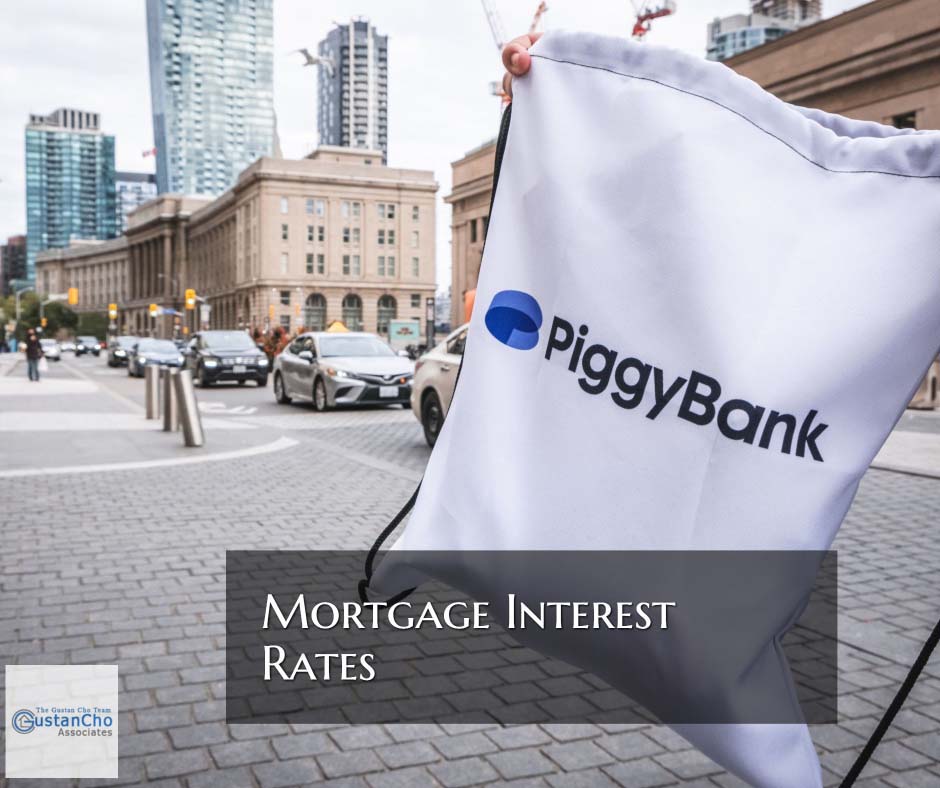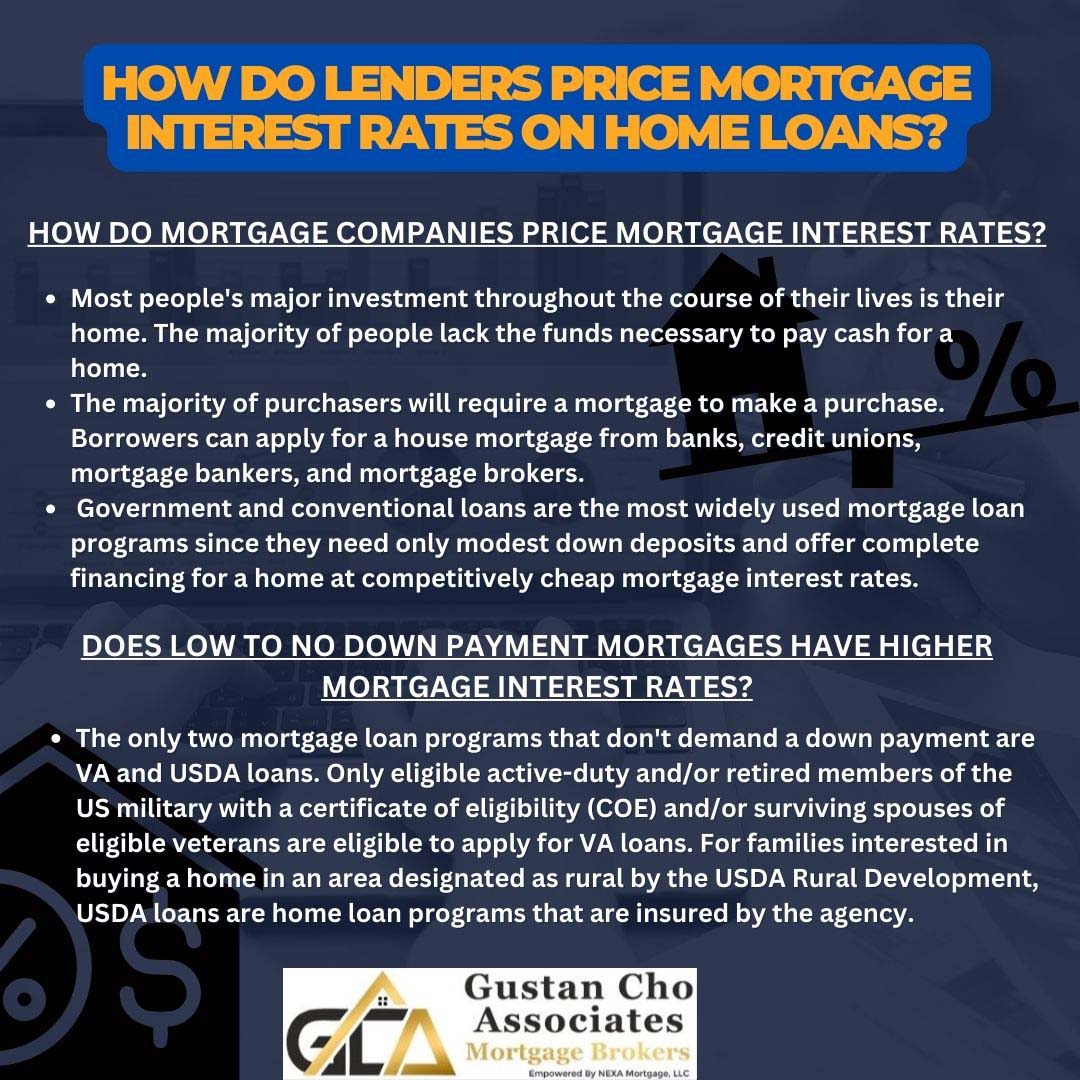How Do Mortgage Companies Price Mortgage Interest Rates?
In this guide, we will cover and discuss how the home buying and refinance mortgage process works. A home is most people’s single largest investment in their lifetime. Most folks do not have the money to purchase a home with cash. Most homebuyers will need a mortgage to purchase a house.
Banks, credit unions, mortgage bankers, and mortgage advisors are the financial institutions borrowers apply for a home mortgage.
The most popular mortgage loan programs are government and conventional loans due to the fact you only need to put in small down payments and get full financing on a home at competitive low mortgage interest rates. Each home loan program has its own down payment requirements for a home purchase.
Does Low To No Down Payment Mortgages Have Higher Mortgage Interest Rates?
VA and USDA loans are the only two mortgage loan programs that do not require a down payment. VA loans are only for eligible active and/or retired members of the United States Military with a certificate of eligibility (COE) and/or surviving spouses of eligible veterans. USDA loans are home loan programs guaranteed by USDA Rural Development for families who are interested in purchasing a home in an area designed rural by the USDA Rural Development. The U.S. Department of Agriculture USDA Rural Development promotes homeownership in designated rural areas throughout the United States.
Secure a Mortgage with a 500 Credit Score – It’s Possible!
Apply Now And Get recommendations From Loan Experts
Mortgage Interest Rates on Government Loans
Homebuyers can qualify for USDA loans at mortgage lenders with no down payment required at competitive mortgage interest rates due to the government guarantee. USDA loans have a maximum household income cap for the area. HUD, the parent of FHA promotes homeownership for first-time homebuyers and borrowers with prior bad credit at competitive mortgage interest rates. HUD requires a 3.5% down payment on a home purchase for borrowers with at least a 580 FICO score.
How Are Mortgage Rates on Borrowers With 500 Credit Scores
Homebuyers can qualify for an FHA loan with credit scores under 580 and down to 500 FICO. However, if your credit score falls between 500 to 579 FICO, a 10% down payment versus a 3,5% down payment is required per HUD agency guidelines. Most folks need a mortgage to purchase a home. Each mortgage loan program has its own minimum agency mortgage guidelines. The goal for homebuyers is to get the lowest possible mortgage interest rates.
How Credit Scores Impact Mortgage Interest Rates on Home Loans
Mortgage lenders consider lower credit score borrowers as higher-risk borrowers. Mortgage interest rates have an impact on debt-to-income ratios when qualifying for a home mortgage. In the mortgage world, the high reward for a lender is charging higher mortgage interest rates. The goal for all borrowers should be to maximize their credit scores prior to applying for a mortgage so they can get the best possible mortgage interest rates. The lower the mortgage interest rates, the lower the monthly payment, and the lower the interest expense. Not every mortgage borrower will get the same mortgage interest rate. The biggest factor mortgage lenders look at when pricing mortgage rates is the borrower’s credit scores.
What Other Factors Impact Pricing on Mortgage Interest Rates
There are other factors that impact mortgage rates, but credit scores are the number one factor in pricing mortgage interest rates. In this guide on mortgage interest rates, we will explain how mortgage interest rates work, how lenders price rates, what is a rate lock, and how to get the best rates. We will also cover the most frequently asked questions we get at Gustan Cho Associates about mortgage interest rates. It will be a comprehensive guide where by the time you have reviewed this guide on mortgage interest rates, you will have a strong understanding of how the mortgage process works and how to maximize your credit scores to get the best rates.
What Are Loan Level Pricing Adjustments on Mortgage Rates?
Loan Level Pricing Adjustments or LLPAs, are pricing hits on layered risk factors charged by lenders. Every mortgage lenders and wholesale lenders have loan level pricing adjustments that will impact mortgage rates. If you are shopping for a new home in a new area, you know how hard it can be to get under contract to buy a home. The housing market is more competitive now than ever. Our professional mortgage team has created an easy-to-use mortgage calculator which also helps borrowers calculate their debt-to-income ratio. In today’s rising rate environment, shopping for a home within your qualifications can be difficult. That is why we created the best-mortgage calculator and the debt-to-income ratio calculator powered by Gustan Cho Associates.
Mortgage Interest Rates Are The Biggest Factor on Monthly Housing Payment
When budgeting for a home loan, you must prepare to pay principal and interest, property taxes, homeowners insurance, and any homeowners association dues. These five areas of your total monthly mortgage payment are referred to as PITIA. A mortgage underwriter will calculate all of these areas as your total monthly mortgage payment.
Knowing your total monthly mortgage payment will help you budget accordingly.
When you are a renter, every year, your landlord has the ability to raise your housing payment. When you buy a house, you are usually locked into a 30-year fixed mortgage program. The only way your payment will change is if your taxes and insurance fluctuate. This will help you and your family have a more consistent budget surrounding housing costs.
Are Mortgage Interest Rates Going Up?
Facts about the housing market. The housing market nationwide has seen some crazy appreciation in the housing market. Home prices across the nation were up over 14% from May 2021 to May 2022. Inventory is incredibly low which is causing the increase in demand. As the federal government does all it can to cool off the housing market, experts predict the housing market still remains stable. While the average home may no longer see multiple offers and bidding wars, home prices are not expected to decline. For more up-to-date information on the housing market nationwide please reach out to your real estate professional.
How To Calculate My Estimated Monthly Payment With Todays Mortgage Interest Rates
The majority of Americans start their home searches on the Internet. Many major housing websites have a calculator that is not accurate. Typically, they show you an interest rate that may not be available and often do not have accurate property tax and homeowners insurance information. That is why we recommend you utilize our state-of-the-art mortgage calculator.
Take the first step towards homeownership today, even with a 500 credit score!
Apply Now And Get recommendations From Loan Experts
Factors That Determine My Monthly Mortgage Payment on a Home Purchase
There are simple input fields that will allow you to enter the price of the home, interest rate, down payment, annual property taxes, and annual homeowners insurance cost. If you are moving to a neighborhood with a homeowners association, there is also a field to enter that cost. After you enter this information, our calculator will show you your total monthly mortgage payment. This will help if you are searching for multiple homes or are out on the road looking at homes with your realtor. Many real estate professionals utilize our calculator to help their clients.
Forecast on 30-Year Mortgage Interest Rates
Above and beyond your total mortgage payment, an underwriter must also verify your debt to income ratio. After the real estate crash of 2008, all underwriters must verify the ability to repay your mortgage. This is why debt to income is a critical qualification for a mortgage loan. Gustan Cho Associates are a no overlay mortgage lender and do not have an additional debt to income restrictions like many banks and lending institutions. Staying within a comfortable monthly budget is more important than your debt-to-income qualifications. Depending on your mortgage program, we are able to stretch your debt to income-ratio to the maximum allowed.
Mortgage Calculator: How Much Home Can I Afford?
Our mortgage calculator will help homebuyers quickly calculate their debt-to-income ratios. You will need to enter in all of your monthly liabilities that report to your credit report. You will need to factor in all of your revolving credit card payments, auto loans, student loans, and any other monthly liabilities shown on your credit report. You will enter this number into our monthly obligation field and our calculator will then tell you your debt to income ratio.
Frequently Asked Questions (FAQs)
1. What factors do lenders use to determine my mortgage rate?
Lenders look at your credit score, loan type, down payment, loan amount, property type, and current market rates.
2. How does credit score affect interest rate?
Homebuyers with high credit scores typically get better interest rates. Lower scores can mean higher rates because lenders see them as a greater risk.
3. Do different loan types have different rates?
Yes. FHA, VA, USDA, Conventional, and Jumbo loans have different pricing models and risk levels, so rates vary.
4. Does the size of my down payment impact the rate?
Yes. A larger down payment often lowers the rate because you reduce your lender’s risk.
5. How does the Federal Reserve influence mortgage rates?
The Fed doesn’t set mortgage rates, but its actions influence the overall interest rate environment by controlling the federal funds rate.
6. Are mortgage rates the same every day?
No. Based on bond markets and economic news, rates change daily—sometimes even multiple times a day.
7. Why do investment properties or second homes have higher rates?
Because they pose more risk to lenders, they charge higher rates than owner-occupied homes.
8. Can I lock in my mortgage rate?
Yes. Most lenders offer rate locks for a set period (usually 15–60 days) to protect you from market changes before closing.
9. How do discount points affect my rate?
Paying discount points lets you “buy down” your interest rate by paying upfront fees in exchange for a lower rate.
10. Why did my lender offer a different rate than I saw online?
Online rates are general estimates and often assume excellent credit, large down payments, and ideal scenarios.
30-Year Mortgage Interest Rates Today
This calculator is designed to help you narrow down your home search and stay within your comfortable monthly budget and debt-to-income threshold. Gustan Cho Associates are excited to help the homebuyers find the home of their dreams. If you need any assistance with our mortgage calculator, please reach out to our team today.
Stay Informed About 30-Year Mortgage Interest Rates – Plan Your Home Financing Wisely!
Apply Now And Get recommendations From Loan Experts




